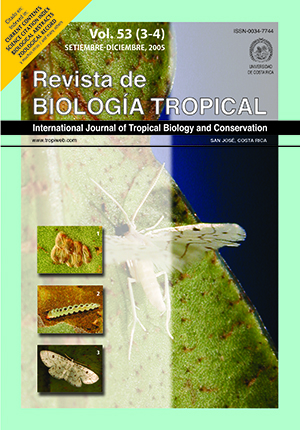Abstract
The validity of the published description of Hyla rufitela is questioned because the origin of the described tadpoles does not correspond to the distribution of this species. The present description, based on tadpoles that were hatched from two egg masses from the Caribbean lowland of Costa Rica, includes tadpoles raised to adult frogs to verify the species. The newly described tadpoles differ from the previously described and illustrated ones not only in color but also by its more slender body shape (body height:body length, 0.43:0.47), the more slender tail (% tail length of total length, 69%:63%), the more conspicuous spiracle and its position, as well as by the larger oral disk width (oral disk width:body width, 0.44:~0.33). The young tadpoles continually ingest mud as is typical of bottom feeders. Nevertheless, older larvae feed on plant material like rotting mellow leaves of Piper auritum. The tadpoles metamorphosed between 44 and 114 days (x=80.3 days) under the described breeding conditions.References
Duellman, W.E. 1970. The Hylid Frogs of Middle America.Monogr. Mus. Nat. Hist. Univ. Kansas, no. 1, 427 p.
Duellman, W.E. 2001. The Hylid Frogs of Middle America. Vol.2, Soc. Study Amph. Rept., Univ.Kansas. No. 1, 694 p.
Gosner, K.L. 1960. A simplified table for staging anuran embryos and larvae with notes on idenfication. Herpetologica 16: 183-190.
Hoffmann, H. 2004. Description of the previously unknown tadpole of Hyalinobatrachium pulveratum (Anura: Centrolenidae). Rev. Biol. Trop. 52: 219-228.
Lips K.R. & J.M. Savage. 1996. Key to the Known Tadpoles (Amphibia: Anura) of Costa Rica. Stud. Neotrop. Fauna Environm. 31: 17-26.
McDiarmid R.W. & R. Altig. 1999. Tadpoles. The Biology of Anuran Larvae. University of Chicago, Chicago, Illinois, USA.
Savage, J.M. 2002. The Amphibians and Reptiles of Costa Rica. University of Chicago, Chicago, Illinois, USA
##plugins.facebook.comentarios##

This work is licensed under a Creative Commons Attribution 4.0 International License.
Copyright (c) 2005 Revista de Biología Tropical






